
Related
At the Munich Security Conference, Vice President Kamala Harris announced the United States has formally determined Russia committed crimes against humanity in Ukraine. Her remarks come amid a “massive justice mobilization” in Ukraine, where investigators are documenting abuses and seeking to prosecute Russian soldiers and leaders, says Reed Brody, a veteran war crimes prosecutor and former counsel for Human Rights Watch. Brody notes that for international law to have force, it must apply to powerful countries including the United States. “You can’t have it both ways. The tools of international justice should not only be aimed at enemies and outcasts,” says Brody.
Transcript
AMY GOODMAN: This is Democracy Now!, democracynow.org, The War and Peace Report. I’m Amy Goodman.
Over the weekend at the Munich Security Conference, Vice President Kamala Harris accused Russia of committing not just war crimes but crimes against humanity in Ukraine.
VICE PRESIDENT KAMALA HARRIS: The United States has formally determined that Russia has committed crimes against humanity. And I say to all those who have perpetrated these crimes, and to their superiors, who are complicit in these crimes, you will be held to account.
AMY GOODMAN: Secretary of State Tony Blinken followed up on Harris’s comments by saying in a statement, “We reserve crimes against humanity determinations for the most egregious crimes. These acts are not random or spontaneous, they are part of the Kremlin’s widespread and systematic attack against Ukraine’s civilian population,” Blinken said.
We go now to Geneva, Switzerland, where we’re joined by the longtime human rights attorney Reed Brody, who’s brought historic legal cases against former Chilean dictator Augusto Pinochet, former Chadian dictator Hissène Habré and others; author of To Catch a Dictator: The Pursuit and Trial of Hissène Habré. He’s former counsel for Human Rights Watch.
Reed, thanks so much for joining us. Can you talk — I don’t know if people caught the shift right now for exactly what Vice President Harris, and I expect tomorrow President Biden in Poland will be saying.
REED BRODY: Well, Vice President Harris basically said what we all know to be true, which is that Russian forces are committing crimes against humanity in Ukraine. Secretary Blinken used — and, in fact, they both used the legal definition, which is crimes committed as part of a widespread or systematic attack on a civilian population. I think we all believe that, you know, the bombing of hospitals and schools, the torture, the sexual violence, the attacks on civilian infrastructures, the deportation of children, these all amount to crimes against humanity. I’m not sure, to be honest, what the — you know, why the statement was made, what legal significance it has that the U.S. has determined that crimes against humanity have been committed. She also talked about how the authors of these crimes will be held to account.
And, of course, as we’ve discussed before, there is a massive justice mobilization in Ukraine, surpassing any precedent by orders of magnitude. You have 66,000 war crimes cases opened by the Ukrainian prosecutor’s office. The International Criminal Court has opened its largest field operation ever. A dozen other states have jumped in to open up cases on their own soil. Many others have supplied assistance, financial, technical assistance to Ukrainian prosecutors. So there is a huge amount of investigation in real time like we have never seen before.
I don’t know what new this is going to bring. I mean, perhaps President Biden is going to explain. Obviously, the U.S., you know, has a very ambiguous relationship, in general, with international justice. It is not a member of the International Criminal Court. It does support, actually, under the Democratic administrations, including the Biden administration — support the work of the International Criminal Court. But we’ll have to really see what this declaration means. I mean, it is a very strong statement, and I think, in many — it is a welcome statement. Crimes against humanity are being committed by Russian forces in Ukraine.
AMY GOODMAN: Reed, we just had you on two weeks ago talking about the issue of war as a crime of aggression, and the problem that poses for the United States, because many might say, “Yes, that’s exactly what’s going on here, but for the United States to say that is to go against its previous positions.”
REED BRODY: Well, of course, I mean, the U.S. position on justice is — you know, on international justice is riddled with double standards. Look, the U.S.'s principal objection to the International Criminal Court is not that they're investigating Africans or they’re investigating these people; the U.S.'s principal objection is that the ICC purports to investigate crimes committed by citizens of non-State Parties. So, the U.S.'s big objection is that the ICC could, and was, until it was deprioritized by the prosecutor, investigate alleged U.S. war crimes in Ukraine. U.S. is not a party, but — excuse me, Afghanistan. U.S. is not a party, but Afghanistan is. The ICC, similarly, is investigating alleged war crimes and crimes against humanity by Russian forces, even though Russia, like the United States, is not a party to the ICC, but is allegedly committing war crimes and crimes against humanity on the territory of a state, Ukraine, which is a party.
The same double standard comes in, or would come in, in terms of aggression prosecutions. Now, Vice President Harris did not talk about the crime of aggression. And one interpretation of why she made such a strong statement on crimes against humanity this weekend is so that she didn’t have to talk about the crime of aggression, because the U.S. is tiptoeing around this issue, for the reason that you mentioned, Amy. The U.S., and the only reason —
AMY GOODMAN: I mean, right now we’re coming up on the 20th anniversary of the U.S. invasion of Iraq, right? In March of 2003.
REED BRODY: Exactly. The only reason the ICC does not — which is investigating Russia, nonparty state, investigating their alleged crimes against humanity and war crimes in Ukraine, but not their aggression, is — and many would say the only reason the ICC hasn’t already indicted Vladimir Putin for the crime of aggression, which was the supreme international crime at Nuremberg, is that the United States, Britain and France insisted, against the majority of the other states, that the ICC should not be able to exercise its aggression jurisdiction against non-State Parties, like the United States, France and Britain, but also like Russia.
So, I mean, again, it’s a very welcome statement, I believe, by Vice President Harris. Russia — these are massive crimes. I mean, we all continue to be shocked and horrified by these crimes. But America has to — the United States has to come to grips with the fact that, whether it’s crimes like the Bush administration, crimes against detainees in Guantánamo, in Abu Ghraib, in secret prisons, that were never dealt with, or the illegal invasion of Iraq by the United States in 2003, in 2002, you can never — you know, you can’t have it both ways. And the tools of international justice should not only be aimed at enemies and outcasts.
AMY GOODMAN: Reed Brody, I want to thank you for being with us, war crimes prosecutor, former counsel for Human Rights Watch, author of To Catch a Dictator: The Pursuit and Trial of Hissène Habré.
Next up, as the Centers for Disease Control warns teen girls face record levels of depression and hopelessness, we look at the role of social media. Back in 30 seconds.

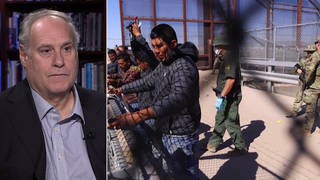
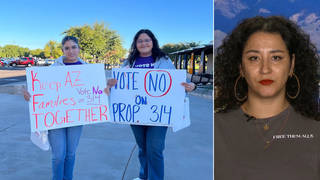

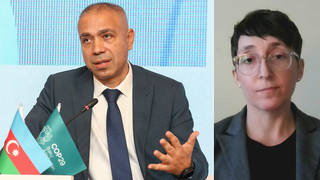





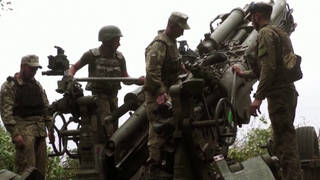
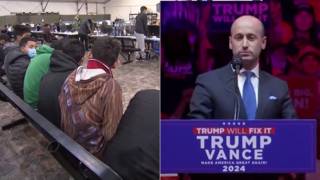
Media Options